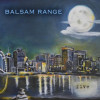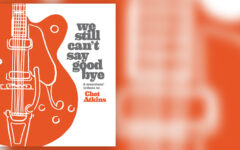
 Over the past few years, North Carolina’s Balsam Range has established itself as one of the most consistent hit-producing and award-winning bands in bluegrass music. Now, coming off of the success of 2012’s Papertown (last year’s IBMA Album of the Year), the five-man group has released their fifth album, the aptly-named Five. The record continues right along in the solid contemporary bluegrass vein they’ve previously made their mark in, sampling bits of traditional grass and a capella Gospel, with lots of soul along the way.
Over the past few years, North Carolina’s Balsam Range has established itself as one of the most consistent hit-producing and award-winning bands in bluegrass music. Now, coming off of the success of 2012’s Papertown (last year’s IBMA Album of the Year), the five-man group has released their fifth album, the aptly-named Five. The record continues right along in the solid contemporary bluegrass vein they’ve previously made their mark in, sampling bits of traditional grass and a capella Gospel, with lots of soul along the way.
As usual with this group, the instrumentation, vocals, and song choices are all top-notch. They’ve become known for recording finely crafted songs, and here they’ve selected several numbers from band favorite, Milan Miller, along with a host of other talented writers. Miller’s cuts on the album include the coal mining song I Spend My Days Below the Ground, co-written with Mark Bumgarner. Though the song speaks of a man who’s spent his life working underground, it also reflects the universal feeling of having to put aside hopes for the future and face life’s realities. Miller also wrote Chasing Someone Else’s Dreams, which contains some of the same sentiments. There’s a lilting guitar intro before Caleb Smith begins singing of the need to work for a living instead of following your dreams.
The band’s tightly woven harmonies shine throughout the album. From a Georgia Battlefield, a weary Civil War song written by Rebecca Peck and set to forlorn, stripped-down instrumentation, is a fine example. The chorus is almost chilling, as a soldier on the edge of death asks that his mother be told that he “died a brave young man.” Buddy Melton’s original Gospel song, Stacking Up the Rocks, is perhaps the prime showcase for the group’s harmony skills. Accompanied only by finger snaps, the bluesy a capella number tells the Biblical story of the Israelites, led by Joshua, who stacked stones along the Jordan River as a memorial to God’s power.
>The group has included a few cover songs, as well. Though not of the standard bluegrass variety, they end up being three of the album’s best cuts. First on the list is Mickey Newbury’s The Future’s Not What It Used to Be, which was previously recorded by Ronnie Milsap. Balsam Range has taken a page from Milsap and included piano and steel guitar in their version, making it into a great country song with excellent lead vocals from Melton. Dan Seals and Bob McDill’s Everything That Glitters (Is Not Gold) is also made into an excellent country-grass song, with tasteful resonator guitar from Tim Surrett and a bit of falsetto from Melton. John Denver’s Matthew on the other hand, has been refashioned as a fine slice of contemporary bluegrass.
Also on the grassier side of things are two lost-love numbers written by Jennifer Strickland. Too High a Price to Pay finds mandolinist Darren Nicholson on lead vocals, singing of a man who is through loving a woman who wants more than he can give, while Don’t Watch These Tears is a nice, upbeat, traditional-leaning piece about a man who vows to keep holding on even though the one he loves is gone.
When you listen to Balsam Range, you know almost exactly what you’re going to get – and that’s not a bad thing. Melton (fiddle), Smith (guitar), Nicholson (mandolin), Surrett (bass and resonator guitar), and Marc Pruett (banjo) deliver excellent contemporary bluegrass with every album, and Five is no different. They’re sure to catch the attention of fans and critics once again.







